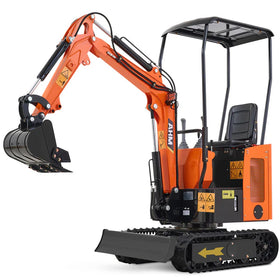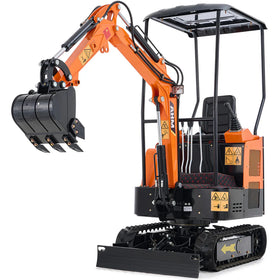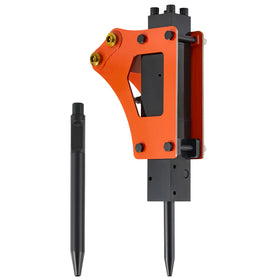Your mini excavator's hydraulic oil does more than just move components - it protects your entire hydraulic system. When oil temperatures rise above 180°F (82°C), this protection starts breaking down. Let's understand why this happens and what you can do about it.

1. What Causes Hydraulic System Overheating?
The hydraulic system in your mini excavator operates under extremely high pressures, pushing oil through incredibly small passages. In ideal conditions, its oil temperature should stay between 140°F (60°C) and 180°F (82°C). But when these passages get restricted or components wear down, heat builds up quickly (Parker Hannifin's research shows that exceeding 180°F accelerates oil breakdown and can severely damage seal materials.).
Several conditions can trigger this overheating:
Internal leakage puts extra strain on your system. As components wear, they create tiny gaps where oil escapes instead of doing its job. This makes your system work harder and generate more heat.
Clogged coolers prevent proper heat transfer. Just like a blocked radiator in your truck, a dirty hydraulic cooler can't remove heat effectively. This problem gets worse in hot weather or during heavy work.
Low oil levels reduce your system's ability to disperse heat. Without enough oil, heat concentrates in certain areas instead of spreading out through the system.
2. Signs Your Hydraulic System Is Overheating

Watch for these warning signs from your mini excavator:
- Sluggish operation, especially during precision work
- Unusual noises when operating controls
- Hot spots on hydraulic components
- Oil that looks darker than usual
- Visible oil leaks around seals
3. How to Stop Hydraulic Overheating Right Now
Take these immediate steps if you notice high temperatures in the mini excavator:
First, check your oil level. Make sure it's at the full mark on your dipstick or sight glass. Low oil is often the simplest cause of overheating.
Next, inspect your cooler. Clear any dirt, mud, or debris blocking airflow through the cooling fins. Good airflow is essential for proper cooling.
If possible, reduce your work load temporarily. This gives your system time to cool down before damage occurs.
4. Preventing Future Overheating Problems

Regular maintenance prevents most overheating issues. Follow these key steps:
Check oil levels daily before starting work. Maintaining proper oil levels helps your system manage heat effectively. (If you want learn more about how to check your hydraulic oil level, read here.)
Clean your cooler weekly. Use compressed air or low-pressure water to clear debris from cooling fins. Avoid damaging the fins - they're crucial for heat transfer.
Replace hydraulic oil on schedule. Fresh oil contains protective additives that help prevent overheating. These additives wear out over time, even if the oil looks clean.
5. Frequently Asked Questions About Hydraulic System Temperature

1) How long should I wait for my hydraulic system to cool down?
Allow at least 30 minutes of idle time or complete shutdown if temperatures exceed 180°F (82°C). The cooling time needed depends on ambient temperature and previous workload intensity.
2) Does cold weather affect hydraulic system temperature?
Yes. Starting work with cold hydraulics can cause damage. Allow 5-10 minutes of gentle operation to warm oil to at least 80°F (27°C) before applying full load.
3) How do weather conditions affect hydraulic cooling?
High humidity reduces cooling efficiency because moist air transfers heat less effectively than dry air. In humid conditions, you might need more frequent cooling breaks.
4) Can adding a bigger hydraulic cooler solve overheating problems?
While larger coolers can help, they're not always the best solution. First address basic maintenance issues like clean cooling fins and proper oil levels. Upgrade cooling capacity only if problems persist after proper maintenance.
5) How does hydraulic oil viscosity relate to temperature?
Oil viscosity decreases as temperature rises. Using the wrong viscosity grade for your climate can lead to excessive heat generation. Check your machine's manual for the correct oil grade for your operating conditions.
6. When to Call for Professional Help

Contact AHM customer service if:
- Temperatures remain high after trying these solutions
- You notice sudden changes in operating temperature
- Your machine loses power along with high temperatures
- You see oil leaking from seals or connections
(At AHM, we offer high quality mini excavators and top-notch customer support for your equipment needs.)
The damage of hydraulic system overheating might not be immediately visible, but it’s happening inside those precision components. Taking care of your hydraulic system’s temperature is protecting your investment that makes sure your mini excavator delivers the performance you need, when you need it.







